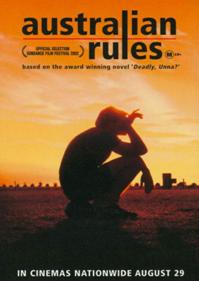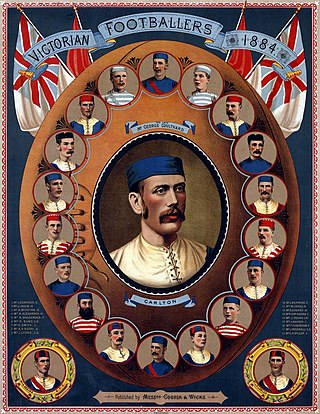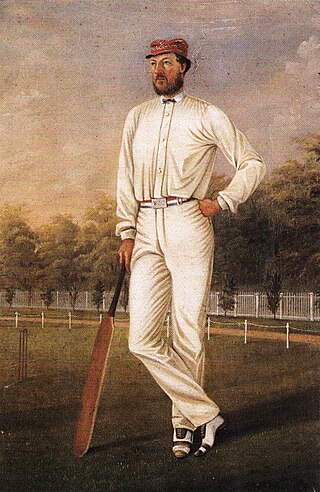
Thomas Wentworth Wills was an Australian sportsman who is credited with being Australia's first cricketer of significance and a founder of Australian rules football. Born in the British penal colony of New South Wales to a wealthy family descended from convicts, Wills grew up in the bush on stations owned by his father, the squatter and politician Horatio Wills, in what is now the state of Victoria. As a child, he befriended local Aboriginal people, learning their language and customs. Aged 14, Wills went to England to attend Rugby School, where he became captain of its cricket team and played an early version of rugby football. After Rugby, Wills represented Cambridge University in the annual cricket match against Oxford, and played at first-class level for Kent and the Marylebone Cricket Club. An athletic bowling all-rounder with tactical nous, he was regarded as one of the finest young cricketers in England.
The Miles Franklin Literary Award is an annual literary prize awarded to "a novel which is of the highest literary merit and presents Australian life in any of its phases". The award was set up according to the will of Miles Franklin (1879–1954), who is best known for writing the Australian classic My Brilliant Career (1901). She bequeathed her estate to fund this award. As of 2016, the award is valued at A$60,000.

Richard Miller Flanagan is an Australian writer, who has also worked as a film director and screenwriter. He won the 2014 Man Booker Prize for his novel The Narrow Road to the Deep North.
The Australian/Vogel Literary Award is an Australian literary award for unpublished manuscripts by writers under the age of 35. The prize money, currently A$20,000, is the richest and most prestigious award for an unpublished manuscript in Australia. Allen & Unwin guarantees to publish the winning work.

Australian Rules is a 2002 Australian sports drama film directed by Paul Goldman and starring Nathan Phillips, Luke Carroll, Tom Budge, Brian Torry and Lisa Flanagan. It was adapted from the novels Deadly, Unna? (1998) and Nukkin Ya by Phillip Gwynne. The film is about a young man experiencing the hardships of growing up in rural South Australia. In particular, it deals with the issue of racial relationships through the central characters, their involvement in local Australian rules football, and Aboriginal players. It was launched at the Adelaide Festival of Arts on 5 March 2002, and nationwide on 29 August 2002.

In 1868, a cricket team composed of Aboriginal Australians toured England between May and October of that year, being the first organised group of Australian sportspeople to travel overseas. It would be another ten years before an Australian cricket team classed as representative left the country.

Marn Grook, marn-grook or marngrook is the popular collective name for traditional Indigenous Australian football games played at gatherings and celebrations by sometimes more than 100 players. From the Woiwurung language of the Kulin people, it means "ball" and "game".
Martin Joseph Flanagan is an Australian journalist and author. He writes on sport, particularly Australian rules football. Flanagan also writes opinion pieces, some of which are examinations of Australian culture and the relationship between Indigenous and non-Indigenous Australians.
Archie Weller is an Australian writer of novels, short stories and screen plays.

The history of Indigenous Australians began at least 65,000 years ago when humans first populated the Australian continental landmasses. This article covers the history of Aboriginal Australian and Torres Strait Islander peoples, two broadly defined groups which each include other sub-groups defined by language and culture.
Andrew McGahan was an Australian novelist. His first novel Praise is considered to be part of the Australian literary genre of grunge lit. His novel The White Earth won the 2005 Miles Franklin Award.

Australian rules football has had a significant impact on popular culture in its native Australia, capturing the imagination of Australian film, art, music, television and literature.
Barry Hill is an Australian historian, writer, and academic.

The origins of Australian rules football date back to the late 1850s in Melbourne, the capital city of Victoria.
This article presents a list of the historical events and publications of Australian literature during 2006.
This article presents a list of the historical events and publications of Australian literature during 2003.

Dick-a-Dick was an Australian Aboriginal tracker and cricketer, a Wotjobaluk man who spoke the Wergaia language in the Wimmera region of western Victoria, Australia. He was a member of the first Australian cricket team to tour England in 1868 and was one of the most well-known Aborigines of the nineteenth century.

In 1870, Irish Australian artist William Handcock completed a portrait of Tom Wills, Australia's pre-eminent cricketer of the mid-19th century and one of the key founders of Australian rules football. It is unknown who commissioned the work or where it was kept after completion, but in 1923 it was acquired by the Melbourne Cricket Club through its then-secretary, Test cricket great Hugh Trumble.
Cricketer and Australian rules football pioneer Tom Wills is the subject of a growing body of works in art and popular culture.
This article presents a list of the historical events and publications of Australian literature during 1998.









